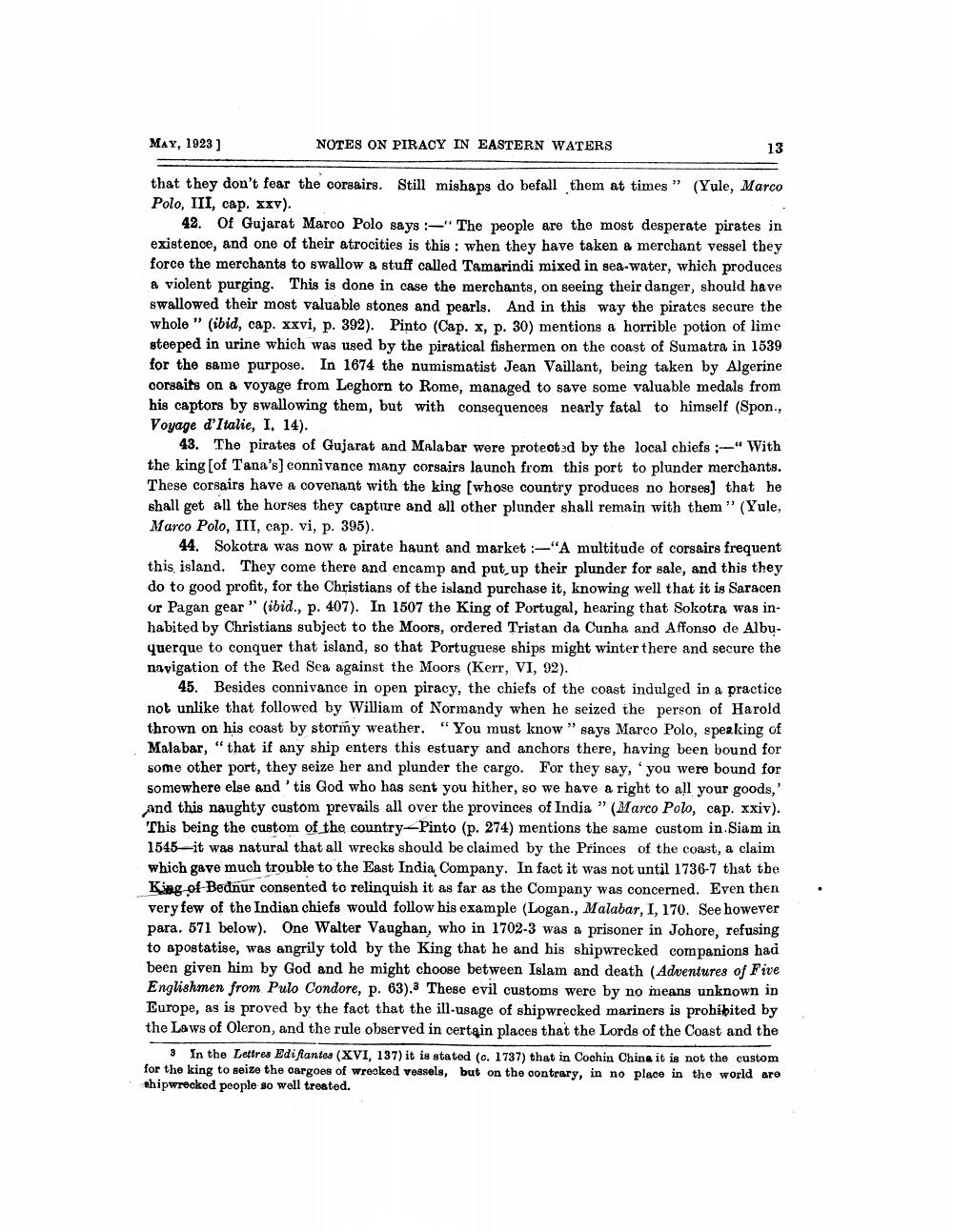________________
MAY, 1923]
that they don't fear the corsairs. Still mishaps do befall them at times" (Yule, Marco Polo, III, cap. xxv).
42. Of Gujarat Marco Polo says:- The people are the most desperate pirates in existence, and one of their atrocities is this: when they have taken a merchant vessel they force the merchants to swallow a stuff called Tamarindi mixed in sea-water, which produces a violent purging. This is done in case the merchants, on seeing their danger, should have swallowed their most valuable stones and pearls. And in this way the pirates secure the whole " (ibid, cap. xxvi, p. 392). Pinto (Cap. x, p. 30) mentions a horrible potion of lime steeped in urine which was used by the piratical fishermen on the coast of Sumatra in 1539 for the same purpose. In 1674 the numismatist Jean Vaillant, being taken by Algerine corsaits on a voyage from Leghorn to Rome, managed to save some valuable medals from his captors by swallowing them, but with consequences nearly fatal to himself (Spon., Voyage d'Italie, I, 14).
NOTES ON PIRACY IN EASTERN WATERS
13
43. The pirates of Gujarat and Malabar were protected by the local chiefs :-" With the king [of Tana's] connivance many corsairs launch from this port to plunder merchants. These corsairs have a covenant with the king [whose country produces no horses] that he shall get all the horses they capture and all other plunder shall remain with them" (Yule, Marco Polo, III, cap. vi, p. 395).
44. Sokotra was now a pirate haunt and market :-"A multitude of corsairs frequent this island. They come there and encamp and put up their plunder for sale, and this they do to good profit, for the Christians of the island purchase it, knowing well that it is Saracen or Pagan gear" (ibid., p. 407). In 1507 the King of Portugal, hearing that Sokotra was inhabited by Christians subject to the Moors, ordered Tristan da Cunha and Affonso de Albuquerque to conquer that island, so that Portuguese ships might winter there and secure the navigation of the Red Sea against the Moors (Kerr, VI, 92).
45. Besides connivance in open piracy, the chiefs of the coast indulged in a practice not unlike that followed by William of Normandy when he seized the person of Harold thrown on his coast by stormy weather. "You must know" says Marco Polo, speaking of Malabar, "that if any ship enters this estuary and anchors there, having been bound for some other port, they seize her and plunder the cargo. For they say, 'you were bound for somewhere else and 'tis God who has sent you hither, so we have a right to all your goods,' and this naughty custom prevails all over the provinces of India" (Marco Polo, cap. xxiv). This being the custom of the country-Pinto (p. 274) mentions the same custom in Siam in 1545 it was natural that all wrecks should be claimed by the Princes of the coast, a claim which gave much trouble to the East India Company. In fact it was not until 1736-7 that the King of Bednur consented to relinquish it as far as the Company was concerned. Even then very few of the Indian chiefs would follow his example (Logan., Malabar, I, 170. See however para. 571 below). One Walter Vaughan, who in 1702-3 was a prisoner in Johore, refusing to apostatise, was angrily told by the King that he and his shipwrecked companions hadi been given him by God and he might choose between Islam and death (Adventures of Five Englishmen from Pulo Condore, p. 63).3 These evil customs were by no means unknown in Europe, as is proved by the fact that the ill-usage of shipwrecked mariners is prohibited by the Laws of Oleron, and the rule observed in certain places that the Lords of the Coast and the
3 In the Lettres Edifiantes (XVI, 137) it is stated (c. 1737) that in Cochin China it is not the custom for the king to seize the cargoes of wrecked vessels, but on the contrary, in no place in the world are shipwrecked people so well treated.




